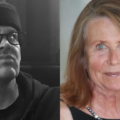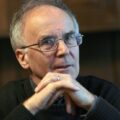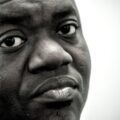Conversations: Heidi Seaborn and Martin Ott

Heidi Seaborn is Poetry Editor for The Adroit Journal, a NYU MFA candidate, and author of an award-winning debut book of poetry Give a Girl Chaos {see what she can do} forthcoming from Mastodon Publishing in March 2019. Since she started writing poetry in 2016, she’s won or been shortlisted for over a dozen awards and has published in numerous journals and anthologies. She graduated from Stanford University.
Martin Ott is the author of eight books of poetry and fiction, including Captive, De Novo Prize Winner (C&R Press, 2012) and Underdays (University of Notre Dame Press, 2015), Sandeen Prize Winner and Forward Indies Finalist. His newest book, Fake News Poems (BlazeVOX Books, forthcoming 2019), takes the headline of a news story from each week as a starting point to explore political and personal turmoil in the first year of Trump’s presidency. His work has appeared in 20 anthologies and more than 200 magazines, including Antioch Review, Epoch, Harvard Review, North American Review, Prairie Schooner, and Zyzzyva. A former US Army interrogator, Ott is a longtime resident of Los Angeles.
Martin Ott: We have both spent our professional careers working in business, with overlap in marketing communications. How much of that experience shapes your creative process (writing strategy, training/continual improvement, brand building, etc.)?
Heidi Seaborn: The common thread between my previous life as a global communications executive and my life as a poet is creating a compelling narrative. Whether it is for the Gates Foundation or within a poem, I’m constantly thinking of Story—what is the story that is going to engage and move people. I’ve always focused on the power of words and poetry for me is where words pack the biggest punch.
As poets, we sweat each word, each line and stanza break. But so too is the process of creating messaging or brand strap lines, for example, where each word is carefully chosen for effect. Beyond that, I’m comfortable with the public side of being a poet from years of public speaking and an understanding of what it takes to build an audience and create a market for my work.
You are balancing two careers, and multiple genres of writing. How do your various professional strands weave together? And how do you balance it all?
MO: I’m not sure I’m always doing a great job juggling genres (poetry, short fiction, novels, TV/screenplay), but I do believe each discipline has informed the others: poetry makes my prose more economical and lyrical; fiction impacts my approach for narrative poetry; screenwriting improves my dialogue in fiction, etc. I have also seen some ideas pass from one genre to another. A spec screenplay I wrote about a magician provided the genesis for a poem “Magician’s Heaven” in my first book of poetry. Planning is a discipline that has carried over from my work career into my creative one.
Each year I do goal setting (I’ve often toyed with the idea of a three-year plan, but I find that difficult as new ideas and opportunities present themselves). I also find ways to make myself accountable—word count for fiction or participating in poetry groups that write drafts on short deadlines. I occasionally use business tools such as Excel to map story plot vs. character arcs for novel planning.
I’ve noticed that we both have a love/preference for narrative poetry. Where do these stories generate from in your work and what is your process for translating them into compelling poetry?
HS: Cribbing my life for poetry is the easy part, finding the poetry in my life is the challenge. It requires a certain distance, as well as the ability to peel back the skin and scavenge the emotional heart. The second section of my book is a series of poems that came from my personal experience of places impacted by natural disaster, terror, war. I refer to this section as “postcards from the aftermath.” It started with one poem about wildfires here in the Northwest and then I literally wrote over forty draft poems as I delved into global hot zones intersecting with my own history to tell the stories of earthquakes in Dubrovnik or Nepal or hostile border crossings in Israel and Berlin from an emotional, experiential place.
In the process of writing this particular series, I realized how resilient the world is. Despite devastation, nature and humanity lean forward to heal, repair and regenerate. This idea became the overarching narrative for my book—that chaos, which according to myth and science gave birth to the universe, can be harnessed into a fulfilling life.
In Fake News Poems, you too wrote known events into poems, often injecting the personal. What surprised you as you were writing these poems? What did it unearth for you?
“My goal is to reach people who never read poetry, to start a conversation where they see a place for poetry in their lives.”
Heidi Seaborn
MO: My first three solo books all integrated personal, political, and social themes with an ongoing trope of unearthing truth—partially from my background as a former US Army interrogator, partially from the investigative process into ourselves and the universe that all writers undertake.
At the beginning of writing Fake News Poems I had a simple premise—to find the most compelling headline each week and use it as a jumping off point in the new age of Trump, where gas lighting has become a national pastime. In reality, I just could not write about politics for 52 weeks, so I ended up with a combination of political, social, scientific, and abstract headlines in an attempt to make sure the book wasn’t one note. These headlines allowed me to write freely, without an agenda, and ties to my personal life bubbled up organically.
For example, a headline from Scientific American—“Birds Nests Used to Look More like Fortresses”—became a poem about my kids leaving the nest but arose from my subconscious fears vs. having a strategy at the beginning of the poem. With access to great poetry in your MFA program as well as editing an awesome journal, Adroit, you currently have exposure to a wide range of voices in poetry. How has this impacted your writing?
HS: Your process for Fake News Poems mimics the way we read the news, always relating it back to our own lives and world-views.
Yes, both my MFA and my work as a Poetry Editor for The Adroit Journal expose me to a broader spectrum of poets and poetry. Reading poetry is the gateway to writing poetry. These days I read a lot—over a hundred books this past term (I’m also a reader for Tupelo Press’ Dorset Prize) and thousands of poems. That kind of volume could be numbing, but I find that the extraordinary seeps into my bloodstream.
For my MFA, I’m reading the extraordinary every day and actively learning from it. I find it useful to “pojack” as Tim Siebels calls it, mimicking a writer’s style to push me out of my comfort zone. I’ve only been writing poetry for three years, I’m on a steep learning curve. My goal is that each poem I write is the best it can be which means that the next one must be better yet. The only way for me to get there is to keep reading and experimenting.
Reading poetry is a gift, but I am imagining that you spent 2017 reading a lot of news—fake news, bad news, weird news. How did you sift through it all to find inspiration? And how has that work informed your writing today?
MO: Before I go on about myself, I want to take a moment to mention how much I admire the range of subject matter and stylistic approaches in your political pamphlet Body Politic and your new book Give a Girl Chaos (and see what she can do). Working on Fake News Poems has forced me to read widely.
One headline in the book I took from National Review, “It’s Time to Do Nothing about Guns,” which I turned into a dystopian poem where guns replace children. The most significant effect of this project, however, has been on my life. I’m now even more of a news junkie and less likely to put my head in the sand.
As writers, I think we all have our antennae out there, trying to gauge our environments, and where we add value among our peers. Even though I left home with no money at seventeen to join the army and have been in debt most of my adult life, I am cognizant of being a cis white male and try to be thoughtful in my subject matter and voice. I’m currently working on a persona poem project, The Destroyer, with a protagonist that personifies Western civilization and whose desire to wreck the world is tempered by a wide range of complicated family relationships and self-destructive tendencies that are semi-autobiographical and sometimes humorous in nature.
Do you have similar questions / concerns about voice and subject matter? If so, how do this affect your current work as a writer and editor?
HS: Yes, I think about this issue quite a bit—a) recognizing my heritage and therefore how that influences how I see the world and naturally, my writing b) how to lean into others’ worlds with a sense of understanding, yet recognizing what’s not knowable, and c) awareness of the parameters that gate my writing.
I recently spent time in the South exploring our slavery and Civil Rights heritage and that experience has invaded my emotional core. At some point, I can imagine it will seep into my writing. The old adage of “write what you know” is probably the best guide to subject and voice. As I say that, I am currently writing in the persona of a famous person who is definitely not me. But I found our common heart and I’m writing from that place outward.
As writers, we want to follow our imagination wherever it leads us. But to make it credible, I think it needs to be grounded in our own truth. Does that make sense? It also seems to me that Fake News Poems is writing the truth against the torrent of lies that have stormed the country. You mention having our antennae up as writers but isn’t it more than that? Do you believe that writers have an obligation of sorts to write the truth, to ring the bell?
MO: I believe the best art opens windows to help people see through the fog of our everyday lives where we labor to make a buck, to provide for our families, to navigate through the white noise of media in an increasingly numb nation.
When I was younger, I devoured hundreds of books that opened me up to different ways of experiencing reality and it changed me. Irrevocably. I have tried to pay this debt forward in my own writing. Being an artist is being subversive.
However, I think it is possible to confuse politics with compelling verse, to err on the side of preaching and teaching in a way that can undercut the power of poetry: in the best poems the writer and reader both learn something from an alchemy of words and images that build to moments almost beyond explanation. One of my mentors used to tell me that sometimes you have to write around a topic, particularly if you’re passionate about it. The point sometimes is not to drive to a point. This is something I understand better the more I write and the older I become.
We both are blessed with a plethora of life experiences (good and bad) that show up in our poetry. What are the advantages and disadvantages you’ve experienced as a poet with a few miles (and kilometers) on your soul?
HS: Obviously, lots of material to write from! That’s a huge advantage, as is perspective. To look back on experiences with an understanding for relevance. I’m always awed by really young poets that bring a degree of discernment to their work. Most don’t as they are still living it. The trick to writing when older is to keep it fresh.
What I find really fascinating is how many people are writing and reading poetry now. The numbers are incredible. Readership volume is being driven by Instagram poets like Rupi Kaur, who are largely shunned by the literary world. Why? No matter what door takes a reader into poetry, it’s an opportunity to expand their love of poetry. I think of myself as a poet that writes poetry that can bridge. My goal is to reach people who never read poetry, to start a conversation where they see a place for poetry in their lives. You’ve been at this longer than me, what do you see as the driving trends in poetry today and how are you responding as a writer?
MO: I believe that we are in a golden age of poetry, with a diverse range of voices and dope verse popping up everywhere in magazines and small presses. Accessibility is on my mind as well, and I work hard to reach non-poets with my writing. My collaborative books with Jon F. Buckley on Brooklyn Arts Press, for example, are humorous and have universal themes (a poetry travelogue / TV-inspired poetry). We should all be thrilled about any avenue that brings more people to poetry (Instagram, YouTube, slam poetry).





